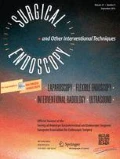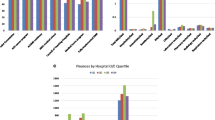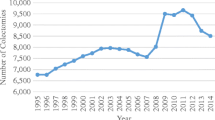Abstract
Background
Although laparoscopic colectomy is reported to have favorable outcomes compared with open colectomy, it has yet to gain widespread acceptance in the United States. This study sought to investigate whether hospital volume is a factor determining the use of laparoscopy for colectomy.
Methods
Using the Nationwide Inpatient Sample (NIS, 1998–2006), patients undergoing elective colon resection with and without laparoscopy were identified. Unique hospital identifiers were used to divide hospital volume into equal thirds, with the highest third defined as high volume and the lower two-thirds defined as low volume. The primary end point was the use of laparoscopy after adjustment for patient and hospital covariates.
Results
A total of 209,769 colon resections were performed in the study period. Overall, only 8,407 (4%) of these resections were performed with laparoscopy. High-volume centers, which tended to be large, urban teaching hospitals, treated more patients in the highest income bracket and patients with private insurance than low-volume hospitals (p < 0.0001). High-volume hospitals used laparoscopy more often than low-volume hospitals (5.2% vs. 3.4%). After adjustment for covariates using multivariate analysis and propensity scores, analysis showed that patients with private insurance and those in the highest income bracket were more likely to receive laparoscopy (p < 0.0009). High-volume hospitals were more likely to perform laparoscopically assisted colectomy than low-volume hospitals (odds ratio [OR], 1.42; 95% confidence interval [CI], 1.23–1.56).
Conclusions
Socioeconomic differences appear to exist between high- and low-volume hospitals in the use of laparoscopy. High hospital volume is associated with an increased likelihood that colectomy will be performed with laparoscopy.

Similar content being viewed by others
References
Csikesz NG, Tseng JF, Shah SA (2008) Trends in surgical management for acute cholecystitis. Surgery Aug 144:283–289
Finlayson SR, Laycock WS, Birkmeyer JD (2003) National trends in utilization and outcomes of antireflux surgery. Surg Endosc 17:864–867
Miller DC, Wei JT, Dunn RL, Hollenbeck BK (2006) Trends in the diffusion of laparoscopic nephrectomy. JAMA 295:2480–2482
Kemp JA, Finlayson SR (2008) Outcomes of laparoscopic and open colectomy: a national population-based comparison. Surg Innov 15:277–283
Kemp JA, Finlayson SR (2008) Nationwide trends in laparoscopic colectomy from 2000 to 2004. Surg Endosc 22:1181–1187
Kennedy GD, Heise C, Rajamanickam V, Harms B, Foley EF (2009) Laparoscopy decreases postoperative complication rates after abdominal colectomy: results from the national surgical quality improvement program. Ann Surg 249:596–601
Bilimoria KY, Bentrem DJ, Merkow RP, Nelson H, Wang E, Ko CY, Soper NJ (2008) Laparoscopic-assisted vs open colectomy for cancer: comparison of short-term outcomes from 121 hospitals. J Gastrointest Surg 12:2001–2009
Pokala N, Delaney CP, Senagore AJ, Brady KM, Fazio VW (2005) Laparoscopic vs open total colectomy: a case-matched comparative study. Surg Endosc 19:531–535
Bennett CL, Stryker SJ, Ferreira MR, Adams J, Beart RW Jr (1997) The learning curve for laparoscopic colorectal surgery: preliminary results from a prospective analysis of 1,194 laparoscopic-assisted colectomies. Arch Surg 132:41–44
Birkmeyer JD, Siewers AE, Finlayson EV, Stukel TA, Lucas FL, Batista I, Welch HG, Wennberg DE (2002) Hospital volume and surgical mortality in the United States. N Engl J Med 346:1128–1137
Finlayson EV, Goodney PP, Birkmeyer JD (2003) Hospital volume and operative mortality in cancer surgery: a national study. Arch Surg 138:721–725
Birkmeyer JD, Sun Y, Wong SL, Stukel TA (2007) Hospital volume and late survival after cancer surgery. Ann Surg 245:777–783
Eppsteiner RW, Csikesz NG, Simons JP, Tseng JF, Shah SA (2008) High volume and outcome after liver resection: surgeon or center? J Gastrointest Surg 12:1709–1716
Dimick JB, Cowan JA Jr, Upchurch GR Jr, Colletti LM (2003) Hospital volume and surgical outcomes for elderly patients with colorectal cancer in the United States. J Surg Res 114:50–56
Kaplan GG, McCarthy EP, Ayanian JZ, Korzenik J, Hodin R, Sands BE (2008) Impact of hospital volume on postoperative morbidity and mortality following a colectomy for ulcerative colitis. Gastroenterology 134:680–687
Csikesz NG, Simons JP, Tseng JF, Shah SA (2008) Surgical specialization and operative mortality in hepatopancreaticobiliary (HPB) surgery. J Gastrointest Surg 12:1534–1539
Elixhauser A, Steiner C, Harris DR, Coffey RM (1998) Comorbidity measures for use with administrative data. Med Care 36:8–27
Rubin DB (1997) Estimating causal effects from large data sets using propensity scores. Ann Intern Med 127(8 Pt 2):757–763
Austin PC, Grootendorst P, Normand SL, Anderson GM (2007) Conditioning on the propensity score can result in biased estimation of common measures of treatment effect: a Monte Carlo study. Stat Med 26:754–768
Miller DC, Taub DA, Dunn RL, Wei JT, Hollenbeck BK (2006) Laparoscopy for renal cell carcinoma: diffusion versus regionalization? J Urol 176:1102–1106
Finlayson EV, Goodney PP, Birkmeyer JD (2003) Hospital volume and operative mortality in cancer surgery: a national study. Arch Surg 138:721–725
A comparison of laparoscopically assisted and open colectomy for colon cancer (2004) N Engl J Med 350:2050–2059
Lezoche E, Feliciotti F, Paganini AM, Guerrieri M, De SA, Minervini S, Campagnacci R (2002) Laparoscopic vs open hemicolectomy for colon cancer. Surg Endosc 16:596–602
Steele SR, Brown TA, Rush RM, Martin MJ (2008) Laparoscopic vs open colectomy for colon cancer: results from a large nationwide population-based analysis. J Gastrointest Surg 12:583–591
Weeks JC, Nelson H, Gelber S, Sargent D, Schroeder G (2002) Short-term quality-of-life outcomes following laparoscopic-assisted colectomy vs open colectomy for colon cancer: a randomized trial. JAMA 287:321–328
Abenhaim HA, Azziz R, Hu J, Bartolucci A, Tulandi T (2008) Socioeconomic and racial predictors of undergoing laparoscopic hysterectomy for selected benign diseases: analysis of 341,487 hysterectomies. J Minim Invasive Gynecol 15:11–15
Scarborough JE, Pietrobon R, Clary BM, Marroquin CE, Bennett KM, Kuo PC, Pappas TN (2008) Regionalization of hepatic resections is associated with increasing disparities among some patient populations in use of high-volume providers. J Am Coll Surg 207:831–838
Pieracci FM, Eachempati SR, Christos PJ, Barie PS, Mushlin AI (2007) Explaining insurance-related and racial disparities in the surgical management of patients with acute appendicitis. Am J Surg 194:57–62
Author information
Authors and Affiliations
Corresponding author
Rights and permissions
About this article
Cite this article
Singla, A., Simons, J.P., Carroll, J.E. et al. Hospital volume as a surrogate for laparoscopically assisted colectomy. Surg Endosc 24, 662–669 (2010). https://doi.org/10.1007/s00464-009-0665-2
Received:
Revised:
Accepted:
Published:
Issue Date:
DOI: https://doi.org/10.1007/s00464-009-0665-2




